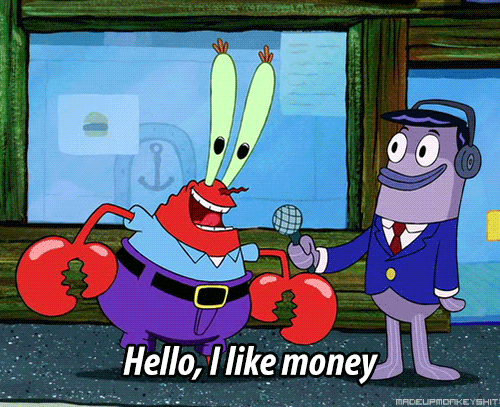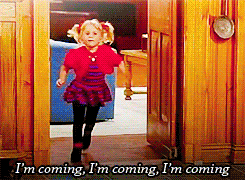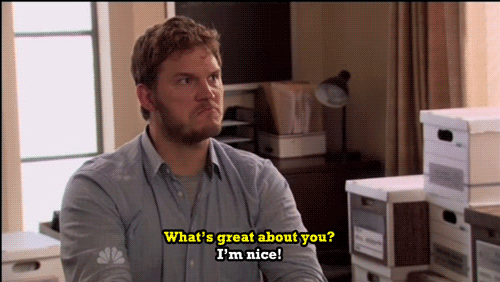
Michal Kowalski / Shutterstock.com
You just got THE phone call. Your résumé and cover letter have caught the eyes of the hiring managers and they want you to come in for a job interview. You feel elated; you know that you’re super qualified and you’ve wanted a job like this one for months. The interview might be the only thing that stands in your way. (Or it might not; some jobs have a rigorous interview process involving a phone interview, a Skype interview, and an in-person interview, not to mention aptitude tests.) Here are a few things to consider before you step into an office and shake your maybe-employer’s hand.

SpongeBob SquarePants / Giphy
Do your research. You should know ahead of time who you will be interviewing with, so look them up. Find out what their positions are within the company and what it is they actually do. After you know a little about your interviewers, do some more research on the company itself. Was it a three-person start-up that grew into an international corporation? Does it sell only eco-friendly products? Find out what sets this company apart from the rest of them. Once you’ve checked out its website, do an internet search for the company and read any news articles that come up. You want to be well informed so that nothing the interviewer says will leave you with your mouth wide open and no words coming out.
- Go the extra mile. Come up with a few questions, too. Showing that you’ve taken the time to learn the company’s background and still want to learn more is a great place to start.
Practice makes perfect. Enlist a family member or a friend to be your make-believe interviewer. Set up a fake interview space, then walk into the room, shake your friend’s hand firmly while introducing yourself, and practice. Sit down, but sit up straight, and look your “interviewer” in the eye. Maintaining eye contact is one way to show that you are interested and invested in the conversation. Have your “interviewer” ask questions likely to come up during your real interview, and start preparing your responses ahead of time.
- “What makes you a good fit for this position?”
- “What background do you have that prepares you to join our team?”
- “What are your weaknesses?”

Parks and Recreation / Giphy
Be honest and thoughtful. Embellishing your answers to an interviewer’s questions is only going to lead to more trouble down the line; you don’t want to get caught in a lie.
Definitely do not check your phone or your watch. In fact, your phone should be on silent in your purse or your pocket. For the duration of the interview, time does not matter. You’re focused on getting a job, not texting your boyfriend or counting down the minutes until your next meal.
Dress for success. Showing up to a job interview in a tank and sweatpants is like showing up to a wedding in your pajamas: a pretty terrible idea. If you want to get a job, you need to look the part; being overdressed, though possibly embarrassing, is much safer than being underdressed. When I interviewed with a tutoring agency, I wore grey slacks and a collared, button-down shirt with pearl earrings and a pair of modest heels; when I interviewed at a restaurant, I wore a long sleeve cotton shirt (without a collar) and khakis; when I interviewed at Old Navy and was told to “dress to impress”, I wore black slacks, black flats, and a sweater with a polo shirt underneath it. I got all three jobs. Here are some tips:
- Dress for the job. If you’re interviewing at a large corporation or with a law firm, you want to be impressive. Wear a suit and tie, a pantsuit, or a skirt suit. If you’re interviewing at a daycare center, it’s okay to be a little more casual. Wear a floral blouse or a button-down and slacks. Avoid shorts, t-shirts, athletic clothes, and anything skin tight or revealing.
- Choose your shoes wisely. While you may really enjoy wearing five-inch heels when you go out on dates, a job interview is no place for these. Keep it modest, maybe just one or two inches, or wear a nice pair of flats or dress shoes. Avoid tennis shoes, anything you’d wear to the gym, flip flops, and anything that makes you walk funny.
- Make sure everything fits. Wearing a suit is great, unless it’s two sizes too big or two sizes too small. Even if your outfit is the most put-together outfit in the world, you won’t make a good impression if nothing fits the way it should.
- Don’t wear perfume or cologne. It can be overpowering and you never know about someone else’s allergies. How horrible would it be if your interviewer had to leave the room, or worse, because of the way you smelled? Stick to deodorant and wear perfume some other time.
- Wear modest makeup and keep jewelry to a minimum. You don’t want to look like a clown, or even more embarrassingly, a tacky clown.

Full House / Giphy
Timing is everything. Arrive early for your interview. You absolutely don’t want to keep an interviewer waiting. Maybe this means that you scope out the parking situation a few days in advance and plan your route, whether you’re going to drive or take public transportation. If something horrible comes up the day of the interview and you know you’re going to be late, give the interviewer a call and explain the situation. It’s absolutely not your fault if a train derails or the subway stops running. Apologize, tell the interviewers when you’re going to arrive, and offer to reschedule if that time doesn’t fit into their schedule.
Be kind. The Golden Rule has been the most important one since preschool: Treat the interviewers the way that you want to be treated. Be respectful, don’t try to talk over them, and don’t act disinterested by what they have to say. Use polite, concise language to convey your honest answers to any questions that you are asked. It’s okay to boast a little about your accomplishments, but be careful not to become too egotistical. Keep a rational head on your shoulders and you’ll be just fine.
After any job interview, you want to thank the interviewers and then, once you get home, send them a thank-you note. You want to show that you appreciate them taking the time to talk to you and you can use this as an opportunity to ask any questions that you thought of after the interview. Good luck!
-
Six Lessons You Will Learn after Losing Your Job
-
How to Prepare for An Administrative Assistant Interview
-
Extreme Makeover: High School Résumé Edition
-
My College Story: Becoming a Brooklyn Designer and Company Owner
-
How to Turn Your Internship into A Job Offer
-
My College Story: Graduating Early and Following My Passions
-
In-Demand Vocations That Are Hiring Right Now
-
Social Networking Platforms for the Creative Student
-
My College Story: Working Full-Time and Attending Graduate School
-
Six Do’s and Don’ts for Your First Day on a New Job
-
My College Story: Student and CEO
-
Why Networking with Classmates Is as Important as Networking with Professionals


